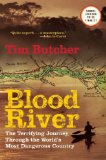Summary | Excerpt | Reviews | Beyond the Book | Readalikes | Genres & Themes | Author Bio

The Terrifying Journey Through the World's Most Dangerous Country
by Tim Butcher
The journey settled into this routine, until Benoit slowed as
he rode into a clearing in the bush. We were up alongside him in an instant and
I could see what he was looking at. There were the burnt remains of dozens and
dozens of huts. The outline of each dwelling was marked in a ring of black ash
and charred thatch around soil beaten hard and flat.
In between the ruins there was nothing - no furniture, no
pots, no possessions, nothing. It would be an exaggeration to say the ruins were
still smoldering, but the air had a tang of acrid smoke. Whatever happened here
had not happened a very long time ago. I looked at Benoit and saw his eyes
stretched wide-open behind his goggles. He was in shock.
'Let's not wait around here,' he said.
Mulolwa was one of the largest bush settlements I had seen,
running alongside the track for at least a kilometer, but there was not a soul
around. We hurried past as fast as we could. Finally we plunged back into the
bush on the far side of the village. It felt like sanctuary.
For several hours we continued to make good time. The bush
level was steadily being raised by taller and taller trees as we approached the
northern edge of Katanga province and prepared to enter Maniema province.
Maniema's reputation for cannibalism, which Stanley noted repeatedly in his
writings, continued to the modern era. In the 1960s 13 Italian airmen from the
UN were killed and eaten, their body parts smoked and made available at local
markets for weeks after the slaughter. Yet Benoit assured me that we would be
safe if we made it in one piece to Maniema.
I was watching the slowly changing forest when Odimba's bike
coughed and died. Odimba was unperturbed, and started to fiddle with the guts of
the bike. I heard him say something about the carburetor and the fuel line, but
in essence the problem was this: the petrol sellers in Kalemie had given us
dirty fuel.
Turning round, I was shocked to see that we were not alone. A
man in rags was watching us, leaning heavily on an old bicycle laden with large
plastic containers. He asked if I had any water. I handed over my bottle and
asked him where he was heading.
'I am walking to Kalemie. I am a palm-oil trader. My name is
Muke Nguy.'
He still had well over 100km to walk. 'I have already walked
200km. It has taken me 16 days.'
He was on a 600km round trip through heavy bush in the
equatorial heat, with no food and no water. His bicycle was so heavily laden
with palm oil that it had long stopped functioning as a means of personal
travel. It was a beast of burden, a way to haul goods through the jungle. The
only things on the bike I could see that were not tradable were a battered
silver pump, a roll of woven-grass matting and a coil of ivy.
'I drink when the path crosses streams, and at night I eat
what I can find in the bush. I have my mat to sleep on, but sometimes the
insects eat me at night. If I get sick, I have no medicine.'
I asked him what the loop of ivy was for. 'That is from a
rubber tree. If I have a flat, I break the ivy and a glue comes out that will
mend the puncture. It is the repair kit of the forest.' For the first time his
gaunt face softened to a smile. 'I carry 80, maybe 100 liters of oil. Maybe I
can make $10 or $15 profit when I get to Kalemie. So I spend my money there on
things we do not have at home, like salt or lakefish. When I get home, I sell
some of the salt for another $10 or $15 profit.'
All this effort for $30 and a fish supper. I was stunned.
Muke was one of many bicycle hauliers I saw. Some carried palm
oil, a few meat - antelope or monkey - and there was even one with 30 African
grey parrots in homemade cages. The haulier proudly said he was going to make
the perilous journey from eastern Congo to Zanzibar, more than 1,000km to the
east, where he might get $50 a bird from tourists. It echoed the slave era, when
Stanley saw Arab slavers in this region driving chain gangs of prisoners for the
same long march to Zanzibar to be sold.
From Blood River by Tim Butcher. Copyright Tim Butcher 2007. All rights reserved. No part of this excerpt maybe reproduced without written permission from the publisher, Grove Press.
Your guide toexceptional books
BookBrowse seeks out and recommends the best in contemporary fiction and nonfiction—books that not only engage and entertain but also deepen our understanding of ourselves and the world around us.